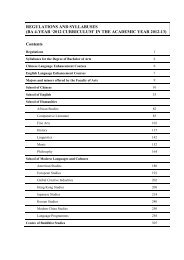Bachelor of Arts (BA) - The University of Hong Kong
Bachelor of Arts (BA) - The University of Hong Kong
Bachelor of Arts (BA) - The University of Hong Kong
Create successful ePaper yourself
Turn your PDF publications into a flip-book with our unique Google optimized e-Paper software.
171GEOG1003.Contemporary global environmental issues (6 credits)(This course is also <strong>of</strong>fered to non-<strong>BA</strong> students for inter-Faculty broadening purposes.)Recent decades have been characterized by increasing awareness <strong>of</strong> environmental issues and the needto come to terms with them. This course introduces the major global environmental issues and linksthem to contemporary socio-economic and political considerations while maintaining a geographicalperspective. <strong>The</strong> course will examine, in turn, many <strong>of</strong> the current major environmental issues relatedto the atmosphere the hydrosphere and the biosphere as well as looking at major threats posed by theenvironment itself in the form <strong>of</strong> natural hazards. In addition, the issue <strong>of</strong> the nuclear threat and theever-increasing demand for energy are explored. Finally, the matter <strong>of</strong> sustained development andintelligent management <strong>of</strong> the planet for this and future generations is addressed.Assessment: 40% coursework, 60% examination.This course will be <strong>of</strong>fered in the first semester.GEOG1005.Map use, reading and interpretation (6 credits)(This course is also <strong>of</strong>fered to non-<strong>BA</strong> students for inter-Faculty broadening purposes.)Maps have been used for centuries to describe spatial patterns and portray association and correlation.Recent developments in digital spatial data handling have changed the environment where maps areused. Maps are no longer confined to the printed format. <strong>The</strong> objective <strong>of</strong> this course is to provide anintegrated discussion <strong>of</strong> standard planimetric maps, their uses, and the basic skills necessary to take fulladvantage <strong>of</strong> these maps. <strong>The</strong> lectures will cover fundamental concepts underlying differentmapping/analytical techniques, their strengths, limitations, and application settings. <strong>The</strong> practicals willbe devoted to imparting essential computer operating skills to visualize spatial data.Assessment: 40% coursework, 60% examination.This course will be <strong>of</strong>fered in the second semester.GEOG1006.Natural resources and conservation (6 credits)(This course is also <strong>of</strong>fered to non-<strong>BA</strong> students for inter-Faculty broadening purposes.)<strong>The</strong> consumption <strong>of</strong> the Earth's resources has reached an alarming intensity and variety in modern times.<strong>The</strong> objective is to survey the major issues related to the tenure <strong>of</strong> human-nature interactions, theircurrent status as well as the prognosis for the future. A synoptic view on the cultural roots <strong>of</strong> theexploitative utilization <strong>of</strong> our planet sets the backdrop for a systematic assessment <strong>of</strong> the different butinterrelated components <strong>of</strong> the resource system. Various abiotic, biotic and abiotic-cum-bioticsegments are discussed in the light <strong>of</strong> their use and misuse, and the possibility for a more enlightenedapproach towards a sustainable future. Adopting a non-technical approach, this course appeals tostudents with training in different science or humanity disciplines.Assessment: 40% coursework, 60% examination.This course will be <strong>of</strong>fered in the second semester.GEOG1011.Introduction to human geography (6 credits)(This course is also <strong>of</strong>fered to non-<strong>BA</strong> students for inter-Faculty broadening purposes.)This is an introductory course about the processes and spatial patterns <strong>of</strong> human activities in aglobalizing world. Important subjects to be discussed will include the development <strong>of</strong> humangeography as a scientific discipline, the processes <strong>of</strong> globalization, geographies <strong>of</strong> population, humanperception <strong>of</strong> nature and society, economic development, agriculture and food resources, politicalgeography, urbanization, and regional development. Emphasis will be placed on the changinginterrelationships between human society and the natural environment in a global context. <strong>The</strong> purposeis to assist students to better understand the patterns, processes and problems <strong>of</strong> human-environmentinteraction in our globalizing world.Assessment: 40% coursework, 60% examination.This course will be <strong>of</strong>fered in the first semester.
















